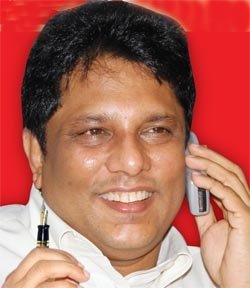 |
They will miss photo opportunity
with many Bollywood stars |
(June 03, 2010, Colombo - Lanka Polity) Eleventh ceremony of Indian International Film Academy Award (ITFA), the Indian equivalent of the Oscars, is to be held in Sri Lanka since today.
However, the event in Colombo is similar to a wedding without bride and bridegroom, when paraphrased according to Sinhala folklore.
Many of the Bollywood super stars have boycotted the awards ceremony although they have used other words to describe their absence. With this, inevitably marred by politics, the 11th IIFA has become the most controversial awards ceremony of entire world in the recent history.
Selecting Colombo as the venue for IIFA was initially a success to the Sri Lankan government. Sri Lanka had hoped to repair its battered international image and revive its tourist industry by hosting the IIFA. Indian government assisted Sri Lankan authorities to sort out the matter as a goodwill gesture to help the nation trying to mark its presence emerging from the debris of three decade war.
But since the venue was announced in April, the Tamil nationalist lobby in South India made the event a success for them using it to raise voice against Sri Lanka government over the woes of the Tamils battered by war in the northern and eastern parts of the island reinforcing the war crime charges haunting intermittently against Mahinda Rajapaksa regime in international politics.
Top Bollywood stars that have pulled out from the IIFA 2010 are too shiny to be absent and the ceremony sans them will definitely be less glamorous posing a threat to the organizers that the event can be an economical loss.
Most damaging of all is the apparent withdrawal of Amitabh Bachchan, the IIFA’s brand ambassador and patriarch of Bollywood’s first family, who met Sri Lanka’s President, Mahinda Rajapaksa, in Colombo in April to help promote the event.
Although the “Big B” has yet to officially announce his absence, industry sources say he will not attend the ceremony for the first time in several years following protests from Tamil groups outside his residence in Mumbai.
His latest postings on his blog and on Twitter say that he is busy shooting an advertisement to promote tourism in the Indian state of Gujarat.
His son, Abhishek Bachchan, and daughter-in-law, Aishwarya Rai, will also be absent officially because they are tied up with promoting their forthcoming film Raavan, according to Indian media reports.
Mani Ratnam, the director refused to show the film in Colombo parallel to the ceremony citing its production work is not yet finished. But, it is well known that Mani, a Tamil, is willingly or unwillingly giving in to the Tamil nationalist lobby.
Eventually, Raavan, the pre-historic king of Lanka who abducted Sita will surrender and play in Rama's side.
Shah Rukh Khan who had been due to captain a team in a celebrity cricket match in Colombo announced his absence in a recent posting on Twitter, saying: “…dont think i will be able to come for iifa..too much work here, will miss Colombo.”
Two people were killed when a Khan concert in Colombo was bombed in 2004, and he vowed at the time that he would not visit Sri Lanka again.
Others likely to be absent include Katrina Kaif, Deepika Padukone, Ranbir Kapoor, Imran Khan and Aamir Khan, according to Indian media reports. Last minute attempts could be observed to prevent Salman Khan playing cricket in Sri Lanka in the cricket match of the cricketers and the film stars scheduled to play tomorrow at Sinhala Sports Club grounds.
Tamil film stars such as Rajnikanth, Kamal Haasan, Mani Ratnam, Vijay, Ajit and Surya are also thought to be staying away.
Namitha, a star of Tamil cinema, issued a statement saying she had turned down an invitation to perform at the ceremony. “How can I attend even after knowing the existing problem? It is the Tamil people who made me what I am today,” she said.
Some second tier stars, including Vivek Oberoi, have already arrived in Colombo for the event, including many of those nominated for awards. “Come to Colombo,” Mr Oberoi told reporters in Colombo today. “I don’t believe in boycotting the awards. Bollywood films are about building bridges, not putting up walls against people.”
Applying more pressure, the South Indian film industry bodies met hours ahead to reiterate their threat to prevent the release of films featuring actors and technicians who attend the awards ceremony in Colombo. “We expect the Bollywood film industry to respect the sentiments of Tamils and refrain from participating in the event,” said L. Suresh, secretary of the South India Film Chamber of Commerce.
The SIFCC is backed by the Film Employees Federation of South India, the Tamil Nadu Theatre-Owners Association and Tamil Nadu Producers’ Council.
South India is a big market for Bollywood after all than Sri Lanka where authorities have restricted the countrymen's access to Indian audio visual art.












![Reblog this post [with Zemanta]](http://img.zemanta.com/reblog_e.png?x-id=0c46e504-5a39-4efb-a82d-812c9b07a1c9)


![Reblog this post [with Zemanta]](http://img.zemanta.com/reblog_e.png?x-id=08d4df3f-a990-4d4e-b84a-ffcb57c44830)

![Reblog this post [with Zemanta]](http://img.zemanta.com/reblog_e.png?x-id=4e304220-1719-48b0-bee9-ee457c1f0e30)

![Reblog this post [with Zemanta]](http://img.zemanta.com/reblog_e.png?x-id=4f5bb79e-a712-4b7c-8b02-4c48c9a1d9cb)

![Reblog this post [with Zemanta]](http://img.zemanta.com/reblog_e.png?x-id=ac13a264-e12b-4d41-acf0-55b42b85bb83)











![Reblog this post [with Zemanta]](http://img.zemanta.com/reblog_e.png?x-id=d719dcae-3621-49fc-adf7-4135a00839f8)

![Reblog this post [with Zemanta]](http://img.zemanta.com/reblog_e.png?x-id=d26ceb8f-e1f0-4395-be21-875b971242b4)



